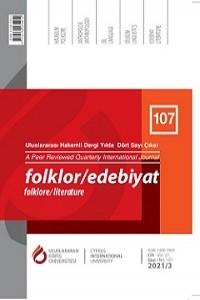Bilge Karasu’nun Apokaliptik Bir Anlatısı: İncitmebeni
An Apocalyptic Narrative of Bilge Karasu: İncitmebeni (Don’t-hurt-me)
Author(s): Seval ŞahinSubject(s): Fiction, Turkish Literature, Theory of Literature
Published by: Uluslararası Kıbrıs Üniversitesi
Keywords: Bilge Karasu; göçmüş kediler bahçesi; fairy tale; apocalyptic narrative; ecocriticism;
Summary/Abstract: In his works, Bilge Karasu examines the relationship between thought and being by creating very different narrative techniques and axis within his texts. Among them, the tales in the Göçmüş Kediler Bahçesi (Garden of Departed Cats, 1979) are worth examining as it is a work that pushes the boundaries of different narrative types and comprises of many different narration techniques. Nature plays an important role in the relationship between existence and thought in Karasu’s works in the Garden of Departed Cats. The nature and its place in one’s life are present in almost all tales. One of the tales, “Humbler”, in which this relationship stands out, is a striking example in terms of both the perception of nature and the relationship between being and thought. In this tale, nature is not a landscape but a living organism itself, and the relationship between the existence of this organism and the existence of humans has been opened to discussion. For this reason, it seems useful to evaluate the tale in terms of eco-criticism so to discuss the positioning of nature, in the relationship between existence and thought. In addition, the tale is an “apocalyptic” narrative, with its characters who are always preparing for a disaster after a disaster, and finally getting caught to it from somewhere they were least expecting.
Journal: Folklor/Edebiyat
- Issue Year: 27/2021
- Issue No: 107
- Page Range: 649-660
- Page Count: 12
- Language: Turkish

